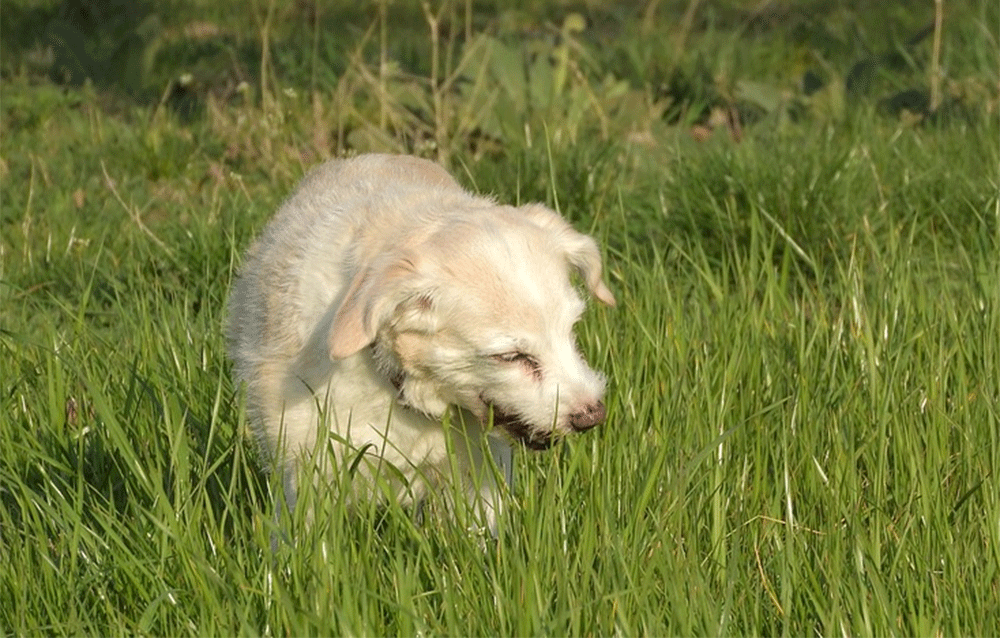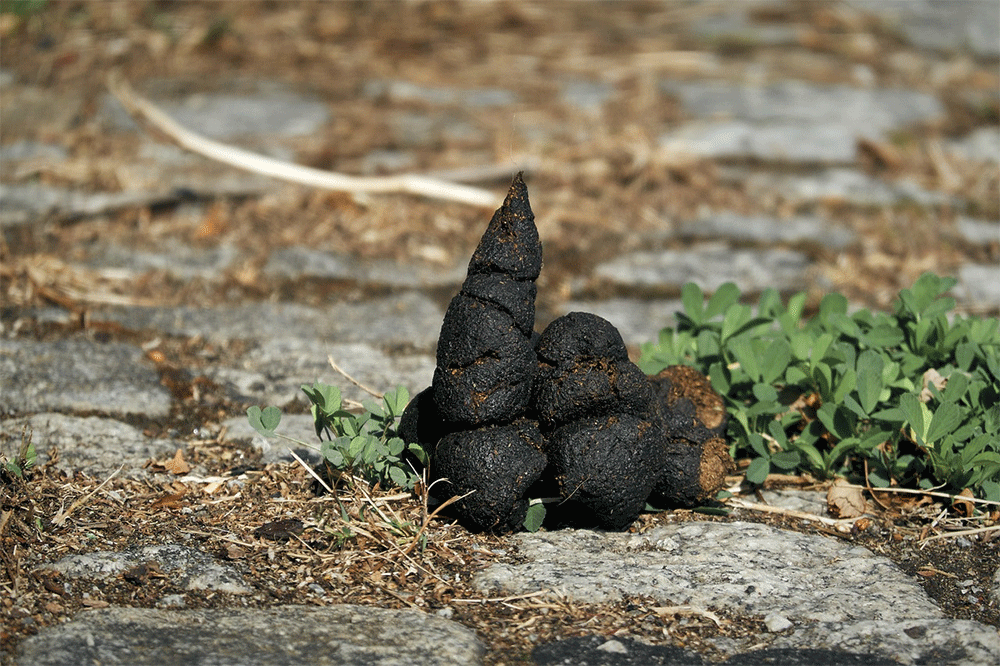There’s no one right answer to this question— the decomposition time of dog poop will depend on a few factors, such as diet and climate. But as a basic rule, you shouldn’t allow dog poop to sit around in a public place. It carries a bunch of harmful bacteria and comes with a lot more consequences than you may think.
Although dog poop can break down on its own, it takes a long time. But just how long?
If left to sit on a patch of grass or soil, you can expect dog poop to take around 9 weeks before it breaks up enough to become invisible.
But even at this stage, it can still be harmful. Just because the dog poop is no longer visible, it doesn’t mean that the bacteria have been killed off. There is always going to be bad bacteria, but it’s a good idea to try to prevent the spread of bad bacteria, like those found in dog poop, wherever possible.

The stages of dog poop decomposition
Week 1
During the first week, the dog poop won’t change much in appearance. Despite this, it’s still packed with harmful bacteria and pathogens. These occur from the dog’s digestive system and get picked up in the poop.
To prevent the harmful consequences, pick up dog poop as soon as you see it.
Week 2
By the second week, decomposition would have begun. The telltale signs of composition are color changes. The poop will look darker than it did when it was first… created.
At this stage, bacteria pose a real risk to wildlife and the environment. If consumed, it could make animals unwell, including other dogs.
Week 3
Not many changes occur during the third week of dog poop decomposition, but you may notice further darkening. The poop will still contain harmful bacteria at this stage and can endanger other animals.
During this third week, mold may begin to grow on the dog poop. This will appear in white tufts across the surface of the poop.
Weeks 4 and 5
By the fourth week, parasitic eggs present in the dog poop will begin to hatch. They will produce parasitic larvae that pose health risks to both dogs and humans. If four-week-old dog poop is consumed, worms can develop in the stomach and gut. Although these aren’t considered lethal, they can cause flu-like symptoms that can make dogs, other animals, and humans sick.
You don’t even have to come into direct contact with dog poop to succumb to its detrimental effects. These germs are usually transferred unintentionally.
For example, if someone accidentally trods in poop while out for a walk, the parasites can travel in the car with you and all the way home. This could ultimately lead to worms being spread to surfaces and objects in your house.
To lessen the chances of accidentally spreading these germs, you’ll need to remain extra vigilant. You should pick any dog poop you notice lying around and be sure to wash your hands straight after disposing of it. It’s also a good idea to disinfect your surfaces daily and keep shoes outdoors where possible.
Weeks 6 and 7
Throughout these weeks, those white tufts of mold will normally have covered the whole poop. Although the mold can look a little gross, it’s usually not anything to worry about. The type of mold that grows on most dog poop isn’t harmful.
However, there are a handful of mold types that can pose a risk to humans. Some can trigger an allergic reaction and others that can harm the respiratory system.
Weeks 7 and 8
By week 7, the dog poop will begin to break down significantly. It will appear dry and shriveled and it’ll be much smaller than it once was. Any grass underneath and surrounding the poop is likely to be dead by this point. This is mainly because the grass isn’t getting the sunlight it needs to survive and the soil may be infected by bacteria and parasites.
Week 9
By the ninth week, the dog poop will probably be invisible. It should have broken up completely and mixed into the soil. Although the poop is no longer visible by this stage, there will still be traces of potentially harmful bacteria lingering in and on the ground.
So, is it possible to speed up dog poop decomposition?

Yes! Although leaving dog poop to just sit and decompose isn’t recommended, there are a few small changes you can make to speed up the process.
Diet
As mentioned earlier, dogs are omnivorous, so they can eat both animal and meat products. If your dog’s diet consists of primarily meat products, their poop is likely going to take longer to decompose than that of a dog that eats grain-based food.
But you shouldn’t take fecal decomposition time into account when choosing the right food for your dog. If you want to make sure a certain food is healthy for your pooch, we recommend asking your vet for their advice.
Flush or no flush?
You’ve probably never thought of flushing your dog’s poop down the toilet. After all, it adds one more step to the poop-disposal process. However, it may be the best thing you can do for the environment.
According to the U.S Environmental Protection Agency and the National Resources Defence Council, flushing dog poop (on its own, not in a bag) down the toilet can prevent harmful bacteria and toxins from entering the soil and harming the local environment. However, cat poop is extremely harmful and should never be flushed down the toilet.
Digesters
Another method of speeding up the decomposition of dog poop is by scooping it into a digester. This helps to break it down quickly thanks to the addition of special enzymes and water. But when using a digester, you’ll probably be adding new poop every day, so it can be hard to know how long it took the “original” poop to decompose. If you live in a warm, humid, or sunny climate, this shouldn’t take longer than around two to three months.
It’s important to note that digesters are not suitable for use on clay soils. This is because the liquified waste struggles to find its way back into the soil. And even if it does, it’s going to take forever to get there. The digester method also isn’t suitable for those living in colder climates where the ground can become frozen. This is because the poop will simply freeze, which halts the decomposition until the temperatures get higher.
Compost it
It’s possible to compost dog poop in your regular composting bin or heap. To help speed up the process even more, be sure to regularly poke and turn your compost as it will break down quicker. According to the U.S Department of Agriculture (USDA), adding a scoop of sawdust to every two shovelfuls of dog poop can speed up the process too. They estimate that it should be left to “bake” for 6-8 before it’s suitable for use as compost.
While proper composting, if done correctly, can eliminate the pesky pathogens found in a meat-eater diet, it’s not recommended for use in vegetable gardens or around fruit trees. It’s fine for use in flower beds, potted plants, and landscaping mulch.
Make a worm farm
If vermiculture piques your interest, or if you just love the environment and nature, a worm farm can be a great way of disposing of dog poop and speeding up the decomposition process. Worms will feed on dog poop as well as other food waste and organic matter in the compost.
Mixing dog excrement with vegetable waste means you must add leaves or newspaper to the bin, as they provide carbon. Because the worms eat the poop, it actually doesn’t decompose. A pound of red worms can eat as much as a half-pound of waste each day. Worms produce their own weight in waste daily, which you can use as fertilizer. As with compost, don’t use dog waste fertilizer on edible plants.
It’s not fertilizer…
Grass doesn’t like dog poop, so it isn’t effective as a fertilizer. This makes it completely different from cow manure. Not all poop is the same, and it primarily depends on diet.
Cows eat only grass, so digested grass isn’t going to harm the soil, as they’re technically the same thing. However, the diet of a dog is far different from that of a cow. A dog’s diet is mainly made up of protein-based foods. As protein is acidic in nature, any waste product will also have a high acid content.
Most dog foods nowadays contain beef, chicken and pork traces, resulting in acidic waste products. Cheap supermarket dog food can also lead to excess nutrients such as nitrogen and phosphorus in the environment if dog poop isn’t scooped up.
A buildup of such nutrients is likely to create an unstable environment in many ecosystems. This is why dog poop isn’t good for grass and can leave your yard looking straw-like and full of bacteria. Yuck!
How dog poop harms the environment
When you leave dog poop on the ground, it eventually breaks down, enters the soil, and finds its way into the local water supply. Over time, this will pollute rivers, streams, creeks and other local waterways.
Dog poop is packed full of bad bacteria, parasites, viruses, and other diseases that can be harmful to animals as well as humans. In addition to these germs, dog poop can also transmit different worm varieties, some of which are harmful to humans.
Roundworms are particularly common in dog droppings, and even once broken down they can live in soil for many years. What’s more, is that according to the Centers for Disease Control (CDC), 14% of Americans test positive for worms.
Some types of bacteria found in dog poop can be particularly harmful to the environment. Campylobacter bacteria is one of the most harmful to humans. Although the infection can cause transient gastrointestinal problems in healthy adults, it can cause life-threatening infections in infants, older persons, and people with weakened immune systems. Dog poop can also carry E.coli, parvovirus, and salmonella.
Un-scooped dog poop is a particular problem in cities. This is because it encourages the presence of pests such as rats and other rodents. In urban areas, animal waste is considered a food source for rats. This can become a problem as rat urine and droppings have been linked to a whole host of nasty diseases that humans are in danger of catching. Some of these include leptospirosis, typhus, and salmonellosis.
Just one gram of dog poop can contain up to 23 million fecal coliform bacteria—all just lying there on the ground. But it’s not just the ground you have to worry about, as it also pollutes the air. A recent study of air samples in Cleveland, Ohio, and Detroit, Michigan, found that 10%–50% of the bacteria in the air came from dog poop.
Bottom Line
Dog poop left on grass will decompose within around 9 weeks. But the potential risk posed to humans and animals can linger for much longer. Even as soon as the first week, poop left to sit on grass can grow parasites and harmful bacteria that pose health risks and endanger the local environment.
Ultimately, you should pick up dog poop as soon as you see it. This will help to keep you, your pooch, and your family safe. Always dispose of dog poop responsibly and consider one of our methods listed above, such as composting. And if you’re using doggy bags, be sure they’re the biodegradable kind. Plastic doggy bags are incredibly bad for the environment, and will make the decomposition process much longer than it needs to be!
